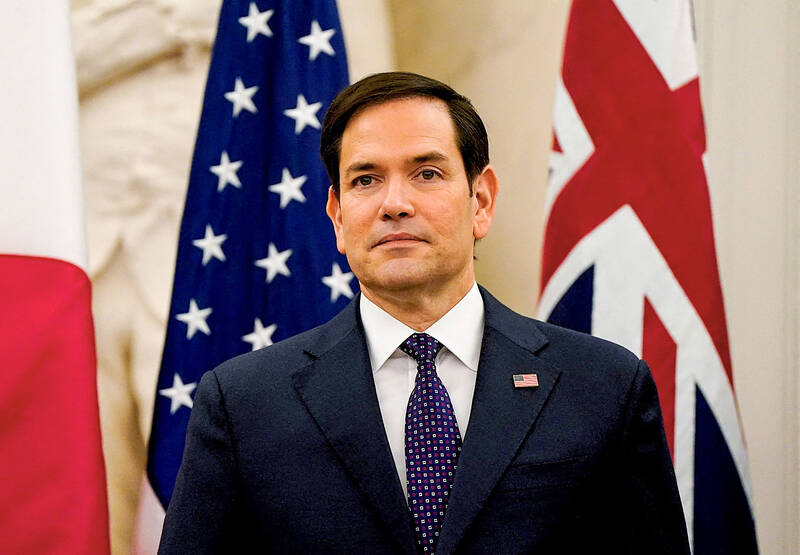US Secretary of State Marco Rubio on Wednesday said that Washington under US President Donald Trump remained committed to the Philippines’ defense, as tensions simmer with Beijing in the South China Sea.
In a call with Philippine Secretary of Foreign Affairs Enrique Manalo, Rubio “underscored the United States’ ironclad commitments to the Philippines under our Mutual Defense Treaty,” US Department of State spokeswoman Tammy Bruce said.
Rubio, a longtime hawk on China, discussed the “dangerous and destabilizing actions in the South China Sea” by the People’s Republic of China.

Photo: Reuters
“Secretary Rubio conveyed that the PRC’s behavior undermines regional peace and stability, and is inconsistent with international law,” Bruce said.
US leaders have repeatedly stood by the Philippines, a treaty ally and former US colony, but Trump is known for questioning alliances, including NATO, claiming allied nations treat the US unfairly by not paying more for defense.
Rubio made the call with his Philippine counterpart a day after a veiled warning to Beijing on the South China Sea during a four-way meeting with his counterparts from India, Japan and Australia.
The Philippines has engaged in increasingly tense confrontations with China over disputed South China Sea waters and reefs over the past year.
China claims most of the strategic waterway, despite an international tribunal ruling that its claim lacked any legal basis.
Manila and Washington have deepened their defense cooperation since Philippine President Ferdinand Marcos Jr took office in 2022 and began pushing back on Beijing’s claims to the South China Sea.
Philippine Secretary of National Defense Gilberto Teodoro also met with US National Security Adviser Mike Waltz at the White House on Wednesday to “discuss critical security matters,” the Philippine Department of National Defense said in a statement.
Teodoro “highlighted the importance of strengthening bilateral defense ties in addressing emerging geopolitical challenges,” the statement said.
“Waltz and his team underscored the need to enhance cooperation with the Philippines and looked forward to increasing mutual security activities in support of a free and global Indo-Pacific [region],” it added.

‘CORRECT IDENTIFICATION’: Beginning in May, Taiwanese married to Japanese can register their home country as Taiwan in their spouse’s family record, ‘Nikkei Asia’ said The government yesterday thanked Japan for revising rules that would allow Taiwanese nationals married to Japanese citizens to list their home country as “Taiwan” in the official family record database. At present, Taiwanese have to select “China.” Minister of Foreign Affairs Lin Chia-lung (林佳龍) said the new rule, set to be implemented in May, would now “correctly” identify Taiwanese in Japan and help protect their rights, the Ministry of Foreign Affairs said in a statement. The statement was released after Nikkei Asia reported the new policy earlier yesterday. The name and nationality of a non-Japanese person marrying a Japanese national is added to the

AT RISK: The council reiterated that people should seriously consider the necessity of visiting China, after Beijing passed 22 guidelines to punish ‘die-hard’ separatists The Mainland Affairs Council (MAC) has since Jan. 1 last year received 65 petitions regarding Taiwanese who were interrogated or detained in China, MAC Minister Chiu Chui-cheng (邱垂正) said yesterday. Fifty-two either went missing or had their personal freedoms restricted, with some put in criminal detention, while 13 were interrogated and temporarily detained, he said in a radio interview. On June 21 last year, China announced 22 guidelines to punish “die-hard Taiwanese independence separatists,” allowing Chinese courts to try people in absentia. The guidelines are uncivilized and inhumane, allowing Beijing to seize assets and issue the death penalty, with no regard for potential

‘UNITED FRONT’ FRONTS: Barring contact with Huaqiao and Jinan universities is needed to stop China targeting Taiwanese students, the education minister said Taiwan has blacklisted two Chinese universities from conducting academic exchange programs in the nation after reports that the institutes are arms of Beijing’s United Front Work Department, Minister of Education Cheng Ying-yao (鄭英耀) said in an exclusive interview with the Chinese-language Liberty Times (the Taipei Times’ sister paper) published yesterday. China’s Huaqiao University in Xiamen and Quanzhou, as well as Jinan University in Guangzhou, which have 600 and 1,500 Taiwanese on their rolls respectively, are under direct control of the Chinese government’s political warfare branch, Cheng said, citing reports by national security officials. A comprehensive ban on Taiwanese institutions collaborating or

STILL COMMITTED: The US opposes any forced change to the ‘status quo’ in the Strait, but also does not seek conflict, US Secretary of State Marco Rubio said US President Donald Trump’s administration released US$5.3 billion in previously frozen foreign aid, including US$870 million in security exemptions for programs in Taiwan, a list of exemptions reviewed by Reuters showed. Trump ordered a 90-day pause on foreign aid shortly after taking office on Jan. 20, halting funding for everything from programs that fight starvation and deadly diseases to providing shelters for millions of displaced people across the globe. US Secretary of State Marco Rubio, who has said that all foreign assistance must align with Trump’s “America First” priorities, issued waivers late last month on military aid to Israel and Egypt, the